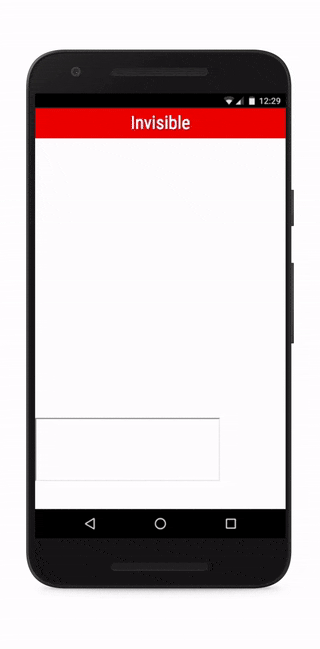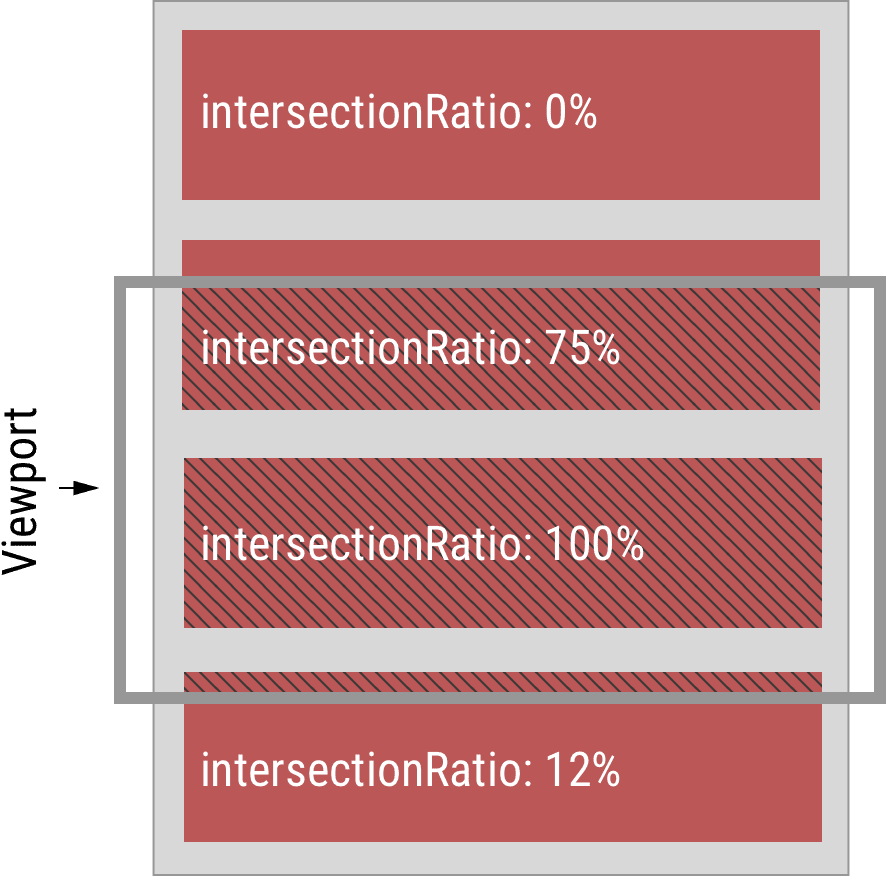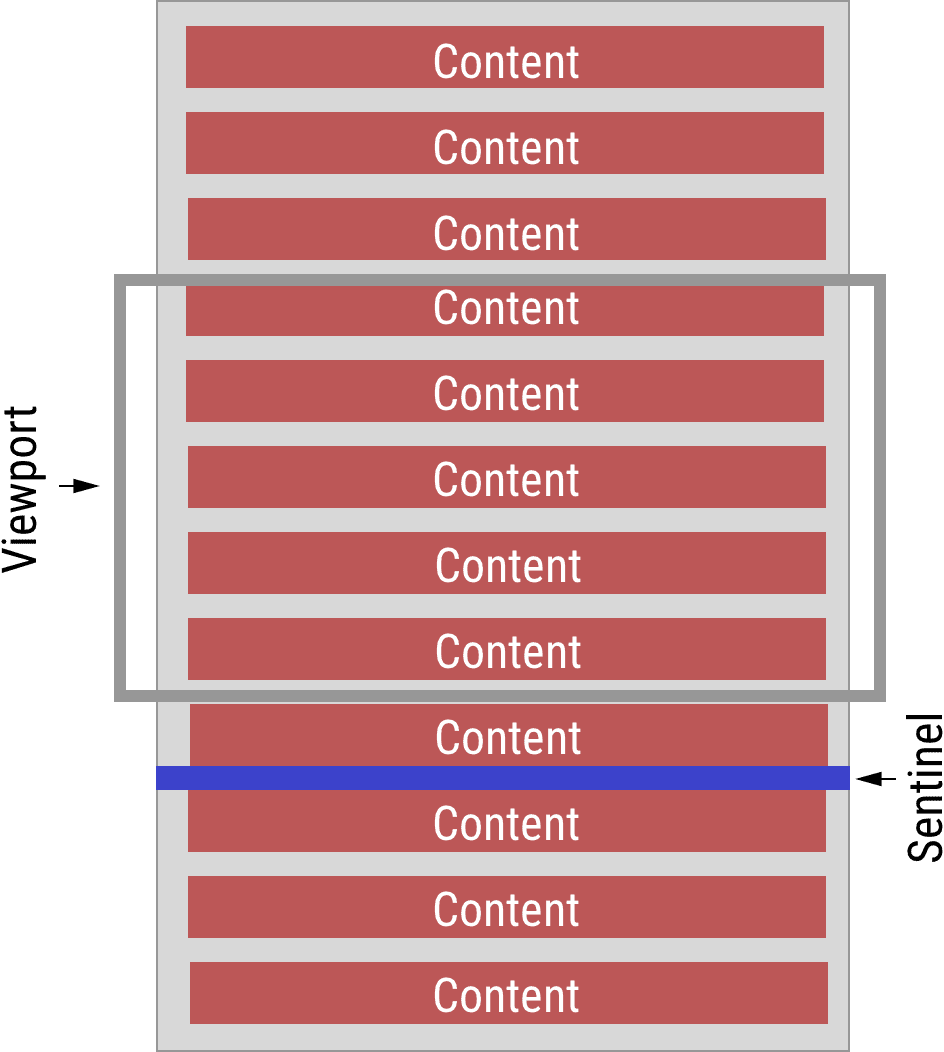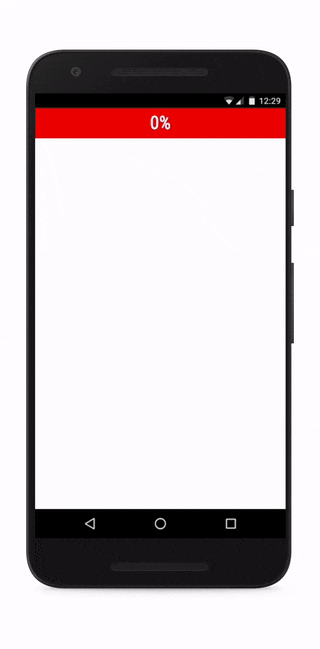IntersectionObserver 可讓您瞭解觀察到的元素何時進入或離開瀏覽器的檢視區域。
假設您想追蹤 DOM 中的元素何時進入可見的檢視區域。您可能會想這麼做,以便及時延遲載入圖片,或是因為您需要知道使用者是否實際查看特定廣告橫幅。您可以連結捲動事件,或是使用週期計時器,並在該元素上呼叫 getBoundingClientRect()。
不過,由於每次呼叫 getBoundingClientRect() 都會強制瀏覽器重新排版整個網頁,且會對網站造成相當大的卡頓,因此這種方法的速度非常慢。如果您知道網站是在 iframe 中載入,且想知道使用者何時可看到元素,那麼情況就會變得相當複雜。單一來源模式和瀏覽器不會讓您存取含有 iframe 的網頁中任何資料。例如,經常使用 iframe 載入的廣告就常發生這種問題。
IntersectionObserver 的設計目標就是讓這項可見度測試更有效率,且已在所有新式瀏覽器中推出。IntersectionObserver 可讓您瞭解觀察到的元素何時進入或離開瀏覽器的檢視區。

如何建立 IntersectionObserver
這個 API 相當簡單,因此最適合透過範例說明:
const io = new IntersectionObserver(entries => {
console.log(entries);
}, {
/* Using default options. Details below */
});
// Start observing an element
io.observe(element);
// Stop observing an element
// io.unobserve(element);
// Disable entire IntersectionObserver
// io.disconnect();
使用 IntersectionObserver 的預設選項時,當元素部分顯示在可視範圍內,以及完全離開可視範圍時,系統都會呼叫回呼。
如果您需要觀察多個元素,建議您多次呼叫 observe(),使用相同 IntersectionObserver 例項觀察多個元素。
entries 參數會傳遞至回呼,而回呼是 IntersectionObserverEntry 物件的陣列。每個這類物件都包含某個觀察元素的更新交集資料。
🔽[IntersectionObserverEntry]
time: 3893.92
🔽rootBounds: ClientRect
bottom: 920
height: 1024
left: 0
right: 1024
top: 0
width: 920
🔽boundingClientRect: ClientRect
// ...
🔽intersectionRect: ClientRect
// ...
intersectionRatio: 0.54
🔽target: div#observee
// ...
rootBounds 是對根元素 (預設為可視區域) 呼叫 getBoundingClientRect() 的結果。boundingClientRect 是系統在觀察元素上呼叫 getBoundingClientRect() 的結果。intersectionRect 是這兩個矩形的交集,可有效指出觀察元素的哪個部分可見。intersectionRatio 與此密切相關,可告知您元素可見的範圍。有了這項資訊,您就能實作相關功能,例如在資產顯示在畫面上之前,即時載入資產。高效。

IntersectionObserver 會以非同步方式提供資料,而回呼程式碼會在主執行緒中執行。此外,規格其實指出 IntersectionObserver 實作項目應使用 requestIdleCallback()。這表示對您提供的回呼呼叫具有低優先順序,且會在瀏覽器閒置期間發出。這是有意做出的設計決策。
捲動 div
我不太喜歡在元素內捲動,但我不會評斷,IntersectionObserver 也不會。options 物件會採用 root 選項,讓您將 viewport 以外的項目定義為根目錄。請務必注意,root 必須是所有觀察元素的祖系。
交集所有內容!
不行!開發人員不良!這並非妥善使用使用者的 CPU 週期。以無限捲動器為例:在這種情況下,建議您在 DOM 中加入哨兵,並觀察 (和回收) 這些哨兵。您應在無限捲動器中,靠近最後一個項目的位置新增哨兵。當該哨兵進入檢視範圍時,您可以使用回呼來載入資料、建立下一個項目、將項目附加至 DOM,並據此重新定位哨兵。如果您妥善回收哨兵,就不需要額外呼叫 observe()。IntersectionObserver 會繼續運作。

更多更新
如先前所述,當觀察到的元素部分顯示在檢視區時,系統會觸發一次回呼,當元素離開檢視區時,系統會觸發另一次回呼。這樣一來,IntersectionObserver 就能回答「是否顯示 X 元素?」這個問題。但在某些情況下,這可能還不夠。
這時 threshold 選項就能派上用場。可讓您定義 intersectionRatio 門檻的陣列。每當 intersectionRatio 跨越其中一個值時,系統就會呼叫回呼。threshold 的預設值為 [0],這會說明預設行為。如果我們將 threshold 變更為 [0, 0.25, 0.5, 0.75, 1],每次元素的四分之一顯示時,我們就會收到通知:

有其他選項嗎?
目前除了上述選項外,還有一個額外的選項。rootMargin 可讓您指定根目錄的邊界,有效地讓您擴大或縮小用於交集的區域。這些邊界會使用 CSS 樣式的字串 ("10px 20px 30px 40px") 指定,分別指定上、右、下和左邊界。總結來說,IntersectionObserver 選項結構體提供下列選項:
new IntersectionObserver(entries => {/* … */}, {
// The root to use for intersection.
// If not provided, use the top-level document's viewport.
root: null,
// Same as margin, can be 1, 2, 3 or 4 components, possibly negative lengths.
// If an explicit root element is specified, components may be percentages of the
// root element size. If no explicit root element is specified, using a
// percentage is an error.
rootMargin: "0px",
// Threshold(s) at which to trigger callback, specified as a ratio, or list of
// ratios, of (visible area / total area) of the observed element (hence all
// entries must be in the range [0, 1]). Callback will be invoked when the
// visible ratio of the observed element crosses a threshold in the list.
threshold: [0],
});
<iframe> 魔術指令
IntersectionObserver 是專為廣告服務和社群網路小工具而設計,這些服務和小工具經常使用 <iframe> 元素,因此可從瞭解這些元素是否顯示在畫面上而受益。如果 <iframe> 觀察其中一個元素,捲動 <iframe> 和捲動包含 <iframe> 的視窗,都會在適當時間觸發回呼。不過,在後一種情況下,rootBounds 會設為 null,以免跨來源洩漏資料。
IntersectionObserver 不是什麼?
請注意,IntersectionObserver 並未刻意追求像素完美或低延遲。使用這些方法實作捲動依附動畫等功能時,一定會失敗,因為在您使用這些方法時,資料將會過時。說明文件會進一步說明 IntersectionObserver 的原始用途。
我可以在回呼中執行多少工作?
簡短精要:在回呼中花費太多時間會導致應用程式延遲,所有常見做法都適用。
繼續前進,並與元素交叉
IntersectionObserver 的瀏覽器支援度良好,因為它可用於所有新式瀏覽器。如有需要,polyfill 可用於舊版瀏覽器,並在 WICG 存放區中提供。顯然,使用原生實作項目的 polyfill 不會帶來效能優勢。
您現在就可以開始使用 IntersectionObserver!請告訴我們你想出什麼解決方法。

